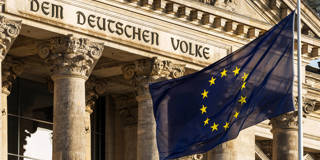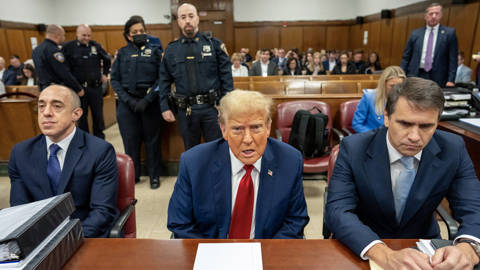BERLIN – Recently, I met up with an ambassador of a Southeast Asian country. We started discussing the current trade dispute between the United States and China, as well as the arrest, on a US warrant, of a senior executive of the Chinese telecoms giant Huawei. My interlocutor then summed up the dilemma facing Germany and Europe.
“The Chinese train left the station years ago. You will not bring it back. But you can’t leap on to it, either, because if you did, you would take a stand against the US,” the ambassador said. “We small countries know the feeling of sitting between stools, and we have learned to keep the balance. For you Europeans, this is new. You’d better learn to keep the balance quickly.”
The United States has long been Europe’s most important ally. But with China now its main competitor, the US is bound to continue shifting its attention to the Pacific. The world’s political and strategic center of gravity will move with it. If Europeans don’t wake up soon, a “G2” world, dominated by the US and China, will become a reality.
This emerging world order presents Europe, and Germany in particular, with two big strategic challenges. Europe must balance its relations with the US and China, as the ambassador said. At the same time, it must advance its common interests much more strongly, so that G2 becomes G3. If Europe succeeds, it will regain global credibility and relevance. If it fails, it will slide quietly into the shadows.
Trump’s Next Target
China and the US will presumably reach some sort of compromise in their trade dispute. For all his bluster, US President Donald Trump needs a deal just as much as his Chinese counterpart, Xi Jinping, who fears an open trade war at a time when domestic economic growth is slowing.
True, even if an agreement is reached, US-China trade tensions will not abate anytime soon, if ever. But a temporary truce with the Chinese will allow Trump to aim his Twitter tirades at Europe again. His main target, as with China, will be the large trade surplus that Europe, and Germany in particular, runs with the US.
Trump is not alone in criticizing Germany’s massive trade surplus, which has led to current-account surpluses of more than 8% of GDP in recent years. The International Monetary Fund says surpluses that consistently exceed 6% of GDP can be a threat to economic stability, because other countries, notably the US, must run persistently large offsetting current-account deficits. This is exactly what Trump wants to stop, which is why Europe, and especially Germany, will come under unprecedented pressure when tensions with China subside.
The China Balance
At the same time, Europe has long shared many of Trump’s trade-related concerns regarding China. These include unfair competition, market-entry barriers, state subsidies, violation of intellectual property rights, and the increasing influence of China’s state apparatus on foreign enterprises. Last and certainly not least is the ability and eagerness of the Chinese state and its security services to access all the data they can get their hands on. These practices are exceptionally costly for the US and European economies, and Europe cannot afford to overlook them while pursuing closer trade and investment ties with China.
But neither can Germany and Europe afford an open economic quarrel with China. German carmakers, engineering firms, and many other industrial companies export heavily to the large and growing Chinese market. Jeopardizing these links could mean an enormous loss of prosperity and growth potential.
A serious spat could also affect Chinese investments in European companies. Huawei, for example, provides 40-50% of Deutsche Telekom’s existing network technology. Excluding it from the German and European telecoms market, as the US wants, would almost certainly trigger a similar Chinese response.
Spectator or Player?
Whatever the outcome of the US-China trade dispute, one thing is clear: Europe, despite its extensive economic ties with both superpowers, is little more than a bystander. Nor does it have any meaningful influence on a range of other global conflicts, not least the ongoing Syrian crisis in its immediate neighborhood. Rarely, in fact, has Europe’s lack of power and relevance as a strategic player been as obvious as it is now.
For starters, the world seems uninterested in European ideas. These include the European Union’s principle of coexistence, according to which smaller member states have the same rights and responsibilities as larger ones, and its underlying belief in the rule of law rather than the rule of the strongest.
Europe may lament the loss of these values in global politics, but “nation-first” leaders in Washington, Beijing, Moscow, and elsewhere don’t particularly care. For them, the world is a competitive arena. Only the fittest will survive, and the weak must follow the strong. Trump, Xi, and Russian President Vladimir Putin are much clearer about this than Europeans are, and all of them are looking for ways to divide us.
Global economic shifts also threaten to leave Europe behind. China’s economy is now probably bigger than that of the eurozone. And, according to some estimates, emerging markets could generate up to 70% of global economic growth between now and 2030. The global axes of political and economic power have shifted, and the age of Eurocentrism is gone for good.
Instead of swimming in vain against this tide, Europe must learn how to advance its interests in a world dominated by the US and China. European values are still important, of course, and should be defended strongly. But just as important, if not more so, Europe must develop a far bolder common voice on economics, defense, and trade. This will require Germany, in particular, to change some of its long-held positions.
Wake Up, Germany!
Germany and Europe must become economically stronger if they want to be taken seriously. For Germany, this means consistently boosting domestic spending to complement its longstanding export strength. US criticism of large German trade surpluses should provide an incentive for action. But the country would have plenty to do in any case, given the decrepit state of its schools and infrastructure, and its excessively large low-wage sector.
Moreover, there is arguably no other country that manages the foundations of its wealth more negligently than Germany. Since the end of the 1980s, the country has had the world’s largest artificial-intelligence center, in Saarbrücken, but underutilizes it. So, while Germany intends to invest tens of billions of euros to end its use of coal power seven or eight years earlier than planned, it is spending only €3 billion ($3.4 billion) on artificial intelligence.
Furthermore, Germany’s integrated value chains – in the car industry, pharmaceuticals, and energy, for example – are its biggest economic advantage. Yet policymakers consider these sectors in isolation and put them under stress almost every day. The EU is making similar mistakes, notably with the European Commission’s recent absurd decision to block a merger that would have created a European rail-industry champion.
In addition, Germany needs to muster the courage to make the euro a true alternative to the US dollar. This will require Germany to end its resistance to joint liability for all eurozone member states, and to accept the financial transfers that such risk-sharing may entail. In return, the EU will need to exercise more control over member states’ budget policies. International investors will back the euro only if Europe stands together.
In Defense of Europe
At the same time, Europe must become a more credible military and security actor, especially in Central and Eastern Europe. The annexation of Crimea in 2014 and the ongoing conflict in eastern Ukraine has stoked fears of Russian aggression in the region. And our Eastern European friends doubt that Western Europeans – Germany included – would be willing to die for their freedom.
Reassuring them will require visible steps, such as the NATO air-policing operation in the Baltics. Germany has sent personnel to this mission, which in itself is remarkable, given the horrors German soldiers inflicted on the region only 80 years ago. Still, much more can be done.
On defense spending, Germany must strike a delicate balance between the urgent need to invest in its military and the potential fears of its neighbors. It is easy for the US to demand that Germany spend 2% of its GDP (about €80 billion) per year on defense, but it is equally easy to imagine how France and Poland would react to this.
To be sure, Germany desperately needs to invest in the Bundeswehr. Hardly a day passes without news about the poor state of military equipment, severe personnel shortages, or delayed procurement. Improving this situation will not, however, cost 2% of GDP per year for the next decade. Instead, Germany should spend 1.5% of GDP per year on its national defense, and a further 0.5% on improving the defense capabilities of its Eastern European partners – for example, the Polish navy.
By taking the lead in financing credible Europe-wide initiatives, Germany would, one hopes, encourage European defense firms to collaborate rather than compete with one another. When every European country is militarily dwarfed by the US and China, it is naive to think that maintaining a cutting-edge national defense capability will make a difference. The time when European countries could indulge in different approaches to defense-industry management is over.
Finally, European heads of state and government should regularly meet as a European Security Council to discuss the defense of the continent’s interests. One of this body’s many difficult tasks will be to find new ways of engaging with Russia on security matters. Europe cannot simply stand by and watch while it once again becomes a deployment zone for nuclear weapons.
More Trade, Please
Europe also needs to sign additional free-trade agreements to make it more attractive as a partner to other countries and economic blocs. Here, the EU’s trade agenda gets it exactly right. A new agreement with Japan took effect on February 1, and a separate deal with Latin America’s Mercosur bloc may not be too far off. Germany must not act as the European brake on future deals, as it did in opposing the Comprehensive Economic and Trade Agreement (CETA) with Canada and the Transatlantic Trade and Investment Partnership (TTIP) with the US. The more interesting Europe is as an expanded market, the stronger it will become vis-à-vis China.
More than ever, the EU needs a common position on China regarding trade and investment. The aim should not be to tag China as an adversary, much less an enemy, but rather to engage with it as an equal. If possible, Europe should do so in consultation with other partners such as Japan, South Korea, and the US. Europe needs new forms of institutionalized cooperation with those countries, with the goal of reforming the World Trade Organization and defending liberal, democratic, and socially responsible market economies.
In its own dealings with China, Europe would be wise to treat as it wishes to be treated. Among other things, this means giving Chinese firms access to the same markets in Europe that European firms may enter in China. European companies should disclose technologies where China requires disclosure. And just as China can send a representative of the Communist Party to all businesses at will, Europe and Germany can demand that their national agencies have full rights to oversee critical Chinese infrastructure projects in Europe. Any disagreements with China should be aired in private. Europe depends on cooperation, and will not get it by publicly kicking Chinese shins.
The Southeast Asian ambassador is right. While the US and Chinese trains accelerate into their new world order, Europe faces a huge struggle to remain credible and relevant. If Germany and other EU members don’t get their collective act together soon, the world will leave them at the station – and, given their current disunity, most likely standing on different platforms.






BERLIN – Recently, I met up with an ambassador of a Southeast Asian country. We started discussing the current trade dispute between the United States and China, as well as the arrest, on a US warrant, of a senior executive of the Chinese telecoms giant Huawei. My interlocutor then summed up the dilemma facing Germany and Europe.
“The Chinese train left the station years ago. You will not bring it back. But you can’t leap on to it, either, because if you did, you would take a stand against the US,” the ambassador said. “We small countries know the feeling of sitting between stools, and we have learned to keep the balance. For you Europeans, this is new. You’d better learn to keep the balance quickly.”
The United States has long been Europe’s most important ally. But with China now its main competitor, the US is bound to continue shifting its attention to the Pacific. The world’s political and strategic center of gravity will move with it. If Europeans don’t wake up soon, a “G2” world, dominated by the US and China, will become a reality.
This emerging world order presents Europe, and Germany in particular, with two big strategic challenges. Europe must balance its relations with the US and China, as the ambassador said. At the same time, it must advance its common interests much more strongly, so that G2 becomes G3. If Europe succeeds, it will regain global credibility and relevance. If it fails, it will slide quietly into the shadows.
Trump’s Next Target
China and the US will presumably reach some sort of compromise in their trade dispute. For all his bluster, US President Donald Trump needs a deal just as much as his Chinese counterpart, Xi Jinping, who fears an open trade war at a time when domestic economic growth is slowing.
True, even if an agreement is reached, US-China trade tensions will not abate anytime soon, if ever. But a temporary truce with the Chinese will allow Trump to aim his Twitter tirades at Europe again. His main target, as with China, will be the large trade surplus that Europe, and Germany in particular, runs with the US.
Trump is not alone in criticizing Germany’s massive trade surplus, which has led to current-account surpluses of more than 8% of GDP in recent years. The International Monetary Fund says surpluses that consistently exceed 6% of GDP can be a threat to economic stability, because other countries, notably the US, must run persistently large offsetting current-account deficits. This is exactly what Trump wants to stop, which is why Europe, and especially Germany, will come under unprecedented pressure when tensions with China subside.
The China Balance
At the same time, Europe has long shared many of Trump’s trade-related concerns regarding China. These include unfair competition, market-entry barriers, state subsidies, violation of intellectual property rights, and the increasing influence of China’s state apparatus on foreign enterprises. Last and certainly not least is the ability and eagerness of the Chinese state and its security services to access all the data they can get their hands on. These practices are exceptionally costly for the US and European economies, and Europe cannot afford to overlook them while pursuing closer trade and investment ties with China.
But neither can Germany and Europe afford an open economic quarrel with China. German carmakers, engineering firms, and many other industrial companies export heavily to the large and growing Chinese market. Jeopardizing these links could mean an enormous loss of prosperity and growth potential.
A serious spat could also affect Chinese investments in European companies. Huawei, for example, provides 40-50% of Deutsche Telekom’s existing network technology. Excluding it from the German and European telecoms market, as the US wants, would almost certainly trigger a similar Chinese response.
Spectator or Player?
Whatever the outcome of the US-China trade dispute, one thing is clear: Europe, despite its extensive economic ties with both superpowers, is little more than a bystander. Nor does it have any meaningful influence on a range of other global conflicts, not least the ongoing Syrian crisis in its immediate neighborhood. Rarely, in fact, has Europe’s lack of power and relevance as a strategic player been as obvious as it is now.
SPRING SALE: Save 40% on all new Digital or Digital Plus subscriptions
Subscribe now to gain greater access to Project Syndicate – including every commentary and our entire On Point suite of subscriber-exclusive content – starting at just $49.99.
Subscribe Now
For starters, the world seems uninterested in European ideas. These include the European Union’s principle of coexistence, according to which smaller member states have the same rights and responsibilities as larger ones, and its underlying belief in the rule of law rather than the rule of the strongest.
Europe may lament the loss of these values in global politics, but “nation-first” leaders in Washington, Beijing, Moscow, and elsewhere don’t particularly care. For them, the world is a competitive arena. Only the fittest will survive, and the weak must follow the strong. Trump, Xi, and Russian President Vladimir Putin are much clearer about this than Europeans are, and all of them are looking for ways to divide us.
Global economic shifts also threaten to leave Europe behind. China’s economy is now probably bigger than that of the eurozone. And, according to some estimates, emerging markets could generate up to 70% of global economic growth between now and 2030. The global axes of political and economic power have shifted, and the age of Eurocentrism is gone for good.
Instead of swimming in vain against this tide, Europe must learn how to advance its interests in a world dominated by the US and China. European values are still important, of course, and should be defended strongly. But just as important, if not more so, Europe must develop a far bolder common voice on economics, defense, and trade. This will require Germany, in particular, to change some of its long-held positions.
Wake Up, Germany!
Germany and Europe must become economically stronger if they want to be taken seriously. For Germany, this means consistently boosting domestic spending to complement its longstanding export strength. US criticism of large German trade surpluses should provide an incentive for action. But the country would have plenty to do in any case, given the decrepit state of its schools and infrastructure, and its excessively large low-wage sector.
Moreover, there is arguably no other country that manages the foundations of its wealth more negligently than Germany. Since the end of the 1980s, the country has had the world’s largest artificial-intelligence center, in Saarbrücken, but underutilizes it. So, while Germany intends to invest tens of billions of euros to end its use of coal power seven or eight years earlier than planned, it is spending only €3 billion ($3.4 billion) on artificial intelligence.
Furthermore, Germany’s integrated value chains – in the car industry, pharmaceuticals, and energy, for example – are its biggest economic advantage. Yet policymakers consider these sectors in isolation and put them under stress almost every day. The EU is making similar mistakes, notably with the European Commission’s recent absurd decision to block a merger that would have created a European rail-industry champion.
In addition, Germany needs to muster the courage to make the euro a true alternative to the US dollar. This will require Germany to end its resistance to joint liability for all eurozone member states, and to accept the financial transfers that such risk-sharing may entail. In return, the EU will need to exercise more control over member states’ budget policies. International investors will back the euro only if Europe stands together.
In Defense of Europe
At the same time, Europe must become a more credible military and security actor, especially in Central and Eastern Europe. The annexation of Crimea in 2014 and the ongoing conflict in eastern Ukraine has stoked fears of Russian aggression in the region. And our Eastern European friends doubt that Western Europeans – Germany included – would be willing to die for their freedom.
Reassuring them will require visible steps, such as the NATO air-policing operation in the Baltics. Germany has sent personnel to this mission, which in itself is remarkable, given the horrors German soldiers inflicted on the region only 80 years ago. Still, much more can be done.
On defense spending, Germany must strike a delicate balance between the urgent need to invest in its military and the potential fears of its neighbors. It is easy for the US to demand that Germany spend 2% of its GDP (about €80 billion) per year on defense, but it is equally easy to imagine how France and Poland would react to this.
To be sure, Germany desperately needs to invest in the Bundeswehr. Hardly a day passes without news about the poor state of military equipment, severe personnel shortages, or delayed procurement. Improving this situation will not, however, cost 2% of GDP per year for the next decade. Instead, Germany should spend 1.5% of GDP per year on its national defense, and a further 0.5% on improving the defense capabilities of its Eastern European partners – for example, the Polish navy.
By taking the lead in financing credible Europe-wide initiatives, Germany would, one hopes, encourage European defense firms to collaborate rather than compete with one another. When every European country is militarily dwarfed by the US and China, it is naive to think that maintaining a cutting-edge national defense capability will make a difference. The time when European countries could indulge in different approaches to defense-industry management is over.
Finally, European heads of state and government should regularly meet as a European Security Council to discuss the defense of the continent’s interests. One of this body’s many difficult tasks will be to find new ways of engaging with Russia on security matters. Europe cannot simply stand by and watch while it once again becomes a deployment zone for nuclear weapons.
More Trade, Please
Europe also needs to sign additional free-trade agreements to make it more attractive as a partner to other countries and economic blocs. Here, the EU’s trade agenda gets it exactly right. A new agreement with Japan took effect on February 1, and a separate deal with Latin America’s Mercosur bloc may not be too far off. Germany must not act as the European brake on future deals, as it did in opposing the Comprehensive Economic and Trade Agreement (CETA) with Canada and the Transatlantic Trade and Investment Partnership (TTIP) with the US. The more interesting Europe is as an expanded market, the stronger it will become vis-à-vis China.
More than ever, the EU needs a common position on China regarding trade and investment. The aim should not be to tag China as an adversary, much less an enemy, but rather to engage with it as an equal. If possible, Europe should do so in consultation with other partners such as Japan, South Korea, and the US. Europe needs new forms of institutionalized cooperation with those countries, with the goal of reforming the World Trade Organization and defending liberal, democratic, and socially responsible market economies.
In its own dealings with China, Europe would be wise to treat as it wishes to be treated. Among other things, this means giving Chinese firms access to the same markets in Europe that European firms may enter in China. European companies should disclose technologies where China requires disclosure. And just as China can send a representative of the Communist Party to all businesses at will, Europe and Germany can demand that their national agencies have full rights to oversee critical Chinese infrastructure projects in Europe. Any disagreements with China should be aired in private. Europe depends on cooperation, and will not get it by publicly kicking Chinese shins.
The Southeast Asian ambassador is right. While the US and Chinese trains accelerate into their new world order, Europe faces a huge struggle to remain credible and relevant. If Germany and other EU members don’t get their collective act together soon, the world will leave them at the station – and, given their current disunity, most likely standing on different platforms.